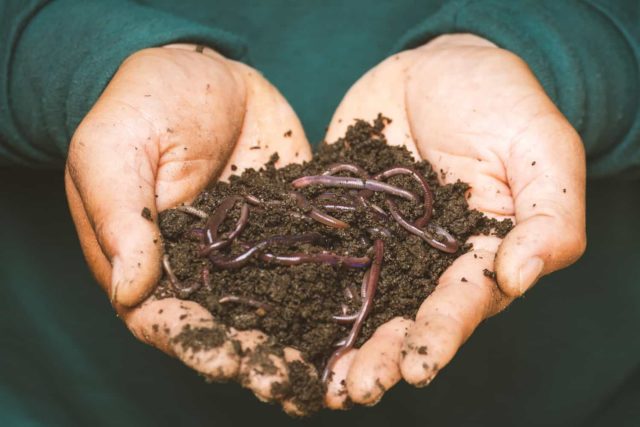How to Start a Worm Farm for Profit and Make Passive Income

My son is 6 years old and already asks about money. While his understanding is limited, my husband and I do our best to explain time value and how dollar bills are just placeholders to buy the things we need.
When he first asked how he could make money, I laughed and told him not to worry about it until he was older. But then I realized that it’s never too early to teach children how to be diligent, enjoy work, and make a few dollars to call their own.
So I set out to find something that even my 6-year-old son could do. Naturally, it made sense to start with something he likes. Insects and small critters came to mind.
And that’s when we decided to learn how to start a worm farm to teach our son how to make money selling worm castings for profit. While it takes some preparation to get started, I knew that raising Red Wiggler worms would be a great side hustle that my son could one day make his own.
We foster relationships with brands we use and trust. The testimonials on our site represent real experiences, but they don’t guarantee you’ll achieve similar results. When you make purchases through our links to our partners, we may earn a commission. Your support helps us continue this work. You can read our full disclosure here.
What is Worm Farming?

Worm farming or vermiculture is the act of raising worms as a business in order to make a profit. The high-quality compost it cultivates is a huge benefit to gardeners.
One of the only types of earthworms for farming that can actually produce in high numbers is Red Wigglers or Eisenia Fetida (also sometimes called redworm, brandling worm, panfish worm, trout worm, etc.). According to Wikipedia, the Red Wiggler “is a species of earthworm that is adapted to decaying organic material.”
Related: How to Get Paid to Assemble Furniture
How Much Can You Make Selling Red Wiggler Worms?
If you flip them for cash on eBay, you can make up to $65 per pound (about 7¢ per worm). You can also check into listing and selling your worms on Amazon.
Another option is to start a Shopify store to sell your worms independently and list your own prices. For example, buckeyeorganics.net is selling its worms for about $36.95 per pound.
Related: Highest Paying Outdoor Jobs Without A Degree
Supplies Needed to Start a Worm Farm
Getting started with your own worm farm is fairly inexpensive, especially if you can buy second-hand. You may even have most of the items needed already on hand. You can find most of the items online or at your local hardware store.
- 1 pound of Red Wiggler Worms
- A plastic bin or two for housing the worms
- A drill to cut air and water drainage holes
- Some old newspapers or cardboard
- Household food waste
Related: How to Become a Woodworker & What to Sell
8 Steps to Worm Farming for Beginners
Worm farming for profit is a great way for lovers of the outdoors to make some passive income. Since it is so easy and inexpensive, anyone who has a passion for it can successfully get started. Worm farming is an activity that the entire family could start together and enjoy as a fun project.
1. Customize a Worm Farming Business Plan
For beginner worm farmers, setting up a personalized business plan is highly suggested. It can be a simple plan to start and should include things like where you will get your startup worms from, how much you will price your worms for, and where you will sell them. Since selling worms is a simple, straightforward task, you can adjust your plan as you go.
Related: Get Paid to Do Weird Things
2. Prepare a Home for the Worms
Worm farming for beginners can seem overwhelming at first but it can actually be very simple. There is no need to get overly creative or make it difficult. You can get started with a simple DIY container.
However, if you are not into DIY, you may prefer to purchase your containers for your worms. You can find some great pre-made worm containers at farm stores, garden stores, and even on Amazon.
To set up your farm, drill small, even holes in your worm box lid so that they have air circulating through the container, prepare a bedding of shredded newspaper, ensure proper drainage, and add the worms.
Make sure to use quality plastic containers. If you don’t have a newspaper, you can also use shredded brown cardboard or shredded non-colored or bleached paper for the bedding as that will be the safest for your worms.
3. Choose the Perfect Spot to Farm
Some great places to keep your worms would be your garage, basement, broom closet, etc. Worms prefer to be in dark moist areas, so you will want to make sure you have a good cover for your worm boxes.
Related: How to Get Paid to Walk Dogs
4. Start a Compost Bin to Save Food for the Worms
Red wigglers can eat up to their full body weight in food per day.
To keep a reminder of what to feed your worms, grab this “What Can Red Wigglers Eat?” refrigerator magnet.
There is no need to buy food for your worms as they will eat table scraps. This is another reason why worm farming is a super low investment business. Your worms will eat most fruit and vegetable scraps. Avoid feeding your worms large quantities of meat, citrus, onions, and dairy foods. Also, avoid processed foods as they can contain preservatives that will deter the worms from eating or potentially harm them later.
You can feed your worms on a schedule of once per week or as often as every two days depending on the scraps you collect. A good tip would be to keep a journal so that you can keep track of how quickly your worms are consuming their food. If your worm box starts to smell bad, that could be a good indication that they are being overfed.
5. Get Your First Batch of Red Wigglers
You’ll need to buy your first batch of worms (unless you have some living in your backyard). You can check your local Petco or gardening store, or you can purchase your first batch on Amazon. This is one of your first real investments, but if you raise the worms right, they will multiply, and you won’t need to buy any more.
6. Prune Castings and Extra Worms From Your Farm
You can sell your worms online or in person by weight or you can sell worm castings. Worm castings are an organic form of fertilizer–basically worm poop. Worm Castings act as a barrier to help plants grow in soil where the pH levels are too high or too low. They will help plants absorb nutrients from the soil by blocking extreme pH levels.
Related: How to Sell Plants From Home
7. Sell Your Increase
Once you’ve harvested extra worms or worm castings, you can actually sell them online or in person. Check with your local gardening or fishing stores to see if you can become a supplier. You can also sell them on eBay or open a Shopify store and ship them.
Related: How to Make Money Selling on Amazon FBA
8. Rinse and Repeat
The nice thing about worm farming for profit is that once you buy the initial batch of worms and the supplies to keep them healthy and happy, you’re typically done investing in your business! Surprisingly, worms are some of the best things you can buy to make money passively.
Worm farming just takes some time to keep your processes running smoothly. Keep pruning from your farm and it will keep giving you more worms to sell online or in person.
Related: How to Invest and Earn Daily Profit
Things to Know Before Starting a Worm Farming Business
If you still have questions about starting a worm farming business, keep reading. It’s not a complicated process, but there are a few things you should know before getting started.
Do you need a license to sell worms?
Be sure to check your state’s requirements with the Small Business Administration before selling anything. Although selling worms shouldn’t require a special permit, in some states, selling physical goods requires you to collect sales taxes. You can always double-check for changes in permit requirements on the SBA’s website as well.
How quickly do worms multiply?
The breeding cycle of worms is about 27 days from mating to laying eggs. Worms can actually double their population about every 60 days.
Who buys “Red Wigglers” aka “compost worms”?
Anyone can buy worms to start worm farming for profit but most typical buyers tend to be gardeners or individuals who want to start a compost bin. Since worms are often used and sold as bait for fishing, some fishermen buy worms for this purpose. Red Wigglers are also great for feeding certain pets such as birds, turtles, and snakes.
Related: How to Get Paid to Go Fishing
Is worm farming really easy?
Worm farming is simple, but it’s not easy until you know what worms need to survive. It may take some trial and error to find the perfect environment for your worms but once you’ve mastered the process, it’s typically smooth sailing from there.
Who Can Start a Worm Farm?
Even a child could raise a Red Wigglers in their spare time. You just need to make sure to feed your worms adequate table scraps such as fruits and veggies and non-processed or fatty foods. You also need to keep them in some solid containers with non-toxic bedding that is comfortable for them.
Worms will be the happiest in a dark and moist place such as your basement or a closet. It really is straightforward and inexpensive to get started worm farming for profit. Just remember that happy worms are profitable worms!
Related: 5 Legitimate Car Wrap Advertising Jobs






![150 Stay-at-Home Mom Businesses [Up to $150k/year]](https://thepayathomeparent.com/wp-content/uploads/2020/06/Mom-and-daughter-in-front-of-laptop.jpg)


